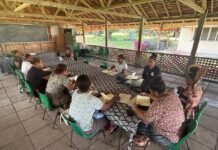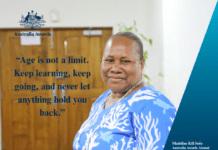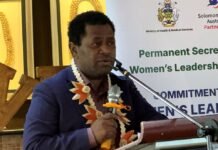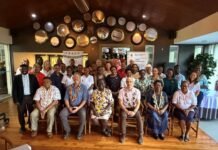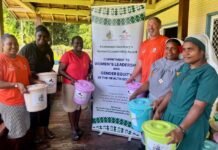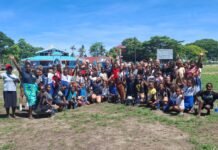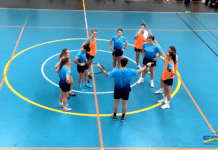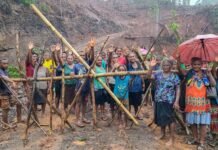BY MIKE TUA
AT first glance, Mary Tuhaika is no new figure to many youth workers, leaders, and the majority of youths in Honiara.
She is no different from other enthusiastic youth leaders in the country.
The 30-year-old is a mother of three children and has a top responsibility to oversee the coordination and implementation of the urban youth policy of the Honiara City Council (HCC).
Her role is also to administer Honiara Youth Council (HYC) workshops, programs, plans, and activities within Honiara’s urban youth hub. Originally from Malaita province, her husband is from Rennell and Bellona province but once you know her she is far from typical.
As HCC’s Youth Development Officer, Mary has a people-oriented personality and has a deep passion and commitment to youth development at a very young age.
“My top priority is to interact with young people,” she says. “My interest in youth development affairs began at the aged of 10.”
Mrs. Tuhaika is currently undergoing tertiary studies – A diploma in Youth Development work and a Diploma in leadership, governance, and human rights both at the University of South Pacific (USP), Honiara Campus, and Solomon Islands National University (SINU), Kukum campus.
Mary’s path toward becoming a youth leader started at an early age since her dad works in the field of community development.
“In those early ages, my dad use to engage my brothers and sisters to be volunteers in community development programs he oversees.
“I received guidance from my dad because nobody wants to take up his profession and so at that early age my interest started to grow in voluntary community and youth work. The more I involve in those activities; the more my interest grows and the more I see the people benefiting from the work I have done,” she said.
She wanted to choose law as her future career but her father seems to convince her every time that she should choose a path to become a youth worker.
“My father has been my greatest inspiration for my career as a youth worker and leader.
“He has been there to give me inspirational advice for me. He told me that they’re a lot of benefits to working and interacting with young people.”
Education and Employment Background
Like most school dropouts, Mary started from a humble beginning. In early 2000, she dropped out of form five at Honiara High school but continued with her youth volunteer work with various Non-Governmental Organizations (NGOs).
“From 2003 to 2005 at the age of 18, I volunteered as a youth worker of HCC’s women and youth division. However, later from 2006 to 2007, I moved out from HCC and was employed by the Regional Assistance Mission to Solomon Islands (RAMSI).
“I was worked as RAMSI’s Case Liaison Officer in the justice and law sector’s care and support unit. But later after only six months with RAMSI, I decided to resign and not to continue my contract that year. I found out that the job does not suit my passion,” she said.
Mary’s passion lies in youth work. In 2007, Mary took up the job at Honiara City Council as a Youth Development Officer.
“HCC publicly issued out a vacancy to fill up the position of Youth development officer. I was encouraged to apply for that job position and so I applied and they accepted me for that position.
“As a former form five leaver, it is not the way I expected that I would be at the moment because during those times only people with qualifications have managed to obtain that position.”
How Mary’s Heart And Mind Value Her Career
Youth empowerment is an attitudinal, structural, and cultural process whereby young people gain the ability, authority, and agency to make decisions and implement changes in their own lives and the lives of other people including youths and adults.
Mary notes that through her youth working experiences and her responsibilities as a youth development officer, she values her career very much.
“I value my career very much because it’s like an extended family. It’s an extended family in the sense that it has become the third priority in my life. My priority is my family, my second priority would be education and other plans and my third priority is youth development work.”
She clearly explained that it’s like a third priority to me because on the daily basis every people I deal with and interact with for example – I have seen youths every day, and I have seen them in their good and bad times.
“I have been in their success and I have been in their failures and it’s more like watching them from birth and where you envisioned them to be.”
“In addition, if you put youth work in a nutshell, it is like a jack of all trades. During my career, I see that I have played different roles at the same time. I can sometimes be a mentor, coach, counselor, mum, and the least goes on.” She believes her work is easy but it has its ups and downs.
“Youth work does not attract attractive packages but one thing you find among youth workers is the passion that drives them. Despite they don’t receive attractive packages like other professions have provided.
“I strongly believe it’s all about the benefits of seeing someone changing their lives now and then. For example, seeing a youth become someone important in a society or country. It’s fun to watch young people growing positively under your wings and therefore that’s the biggest benefit and it’s better than the money,” Mary said.
Most Challenging Aspects of Her Job
Every day ends with personal reflections and fulfilling priorities because the emotions people feel daily can sometimes be overwhelming.
At the moment her husband is away overseas. She lives on her own with her kids while her partner is on academic studies overseas.
“My current challenges would be preparing and settling my kids who all are under the age of five before going to work. Although I am committed to my studies I am trying to balance those difficulties without my partner around but despite that, I have to rely much on my parents and my siblings to assist me whenever I need help.
“There is always my belief that despite our father being away and not here at the moment, I know very well that while he is on studies, he is creating a better future for our children,” Mary says.
“Therefore having those positive thoughts and support behind me I found it is enough to get a balance in those three difficult areas.
“Those are priorities I have to meet every day especially in making sure my kids are settled before going to work.” As a female youth development officer, she also works with other people in dealing with relevant youth development issues.
“My job demands trust. Therefore, I must be approachable to inspire and motivate young people because not all youths have the same social backgrounds. Some youths might have problems back at home, stress at school, and other social problems issues.
“Those different situation demands different types of skills and approach.”
Great Successes and Achievement
Sometimes professional successes and achievements can be rewarding especially when sacrifices and commitments made are paid off with accomplishments.
“All my successes have not been done by myself but they are instrumental people who have always been behind my back and who have supported me all through my journey in life as a youth worker and leader.
“Having led a group of young people raising funds to go to New Caledonia in 2013 was one of my greatest successes in my career.
She said through the partnership that HCC has created they managed to select 15 young people to go to New Caledonia.
“Having four weeks of fundraising and we raised almost $200,000.00 to ensure our local youth delegation can attend the 2nd pacific youth and sports conference held in New Caledonia in 2013.
“They have proven themselves by winning a project award.”
The project called Youth Substance Striker – Kicking the Habits by Kicking Goals will mainly target communities in Honiara about the importance of health and sports.
The use of sports as a mechanism to share social development information and promote awareness on how to tackle the issues of substance abuse among young people in the Solomon Islands.
Engaging youths in sporting activities play an important role in preventing substance abuse among youths. The benefits of engaging youths in sports are very significant.
Positive outcomes include a decrease in the rate of substance abuse, a decrease in the rate of crime, an increase in academic performance, and a more meaningful connection with other members of the community.
She said watching youth volunteers that I have mentored getting permanent jobs year by year is also seen as a major achievement in my career.
“Although it might take one year or almost two years before they are fully equipped to take permanent jobs I know for sure know that when they get those jobs, they were there to stay.
“I have gotten good feedback from bosses of young people that I have mentored that they have proven themselves and that they are capable of carrying out tasks that they are job descriptions required them to do.”
Overview of women and youth development here despite many social-economic development challenges our country faces over the years, our visions continue to grow. The need for women and youth leaders to step up to the plate and take charge in their communities has been a great challenge.
Mary said women need to prove themselves that they can do things that men can do. Because youth work is practically male-dominated.
“For example, if you go out in any community youth group in Honiara, I think basically out of the 30 registered here only two are female youth leaders and others are male.
“Females youth leaders have advantages for example places where male youth leaders cannot reach females can reach.” She said there are two things to address in the broader youth development of this country.
“You have two know the basis of how youth work exists? Youth work exists because of young people. Therefore, by moving youth work forward we must deal with young people at a personal level.
“There are two stages youth workers must consider for example firstly is the transition from childhood to adulthood. It happens psychologically because it is a time a person explores many things in life whether it is good or bad.
“Therefore, the role of youth workers is to give youths the right directives in the transition phase of their life so that by the time they overcome that phase of transition, they will come to the second phase of transition.
“The next phase is when they come to education, economic empowerment, and employment which qualifies them to settle down in life. It is where young people can find employment to sustain their basic needs.”








